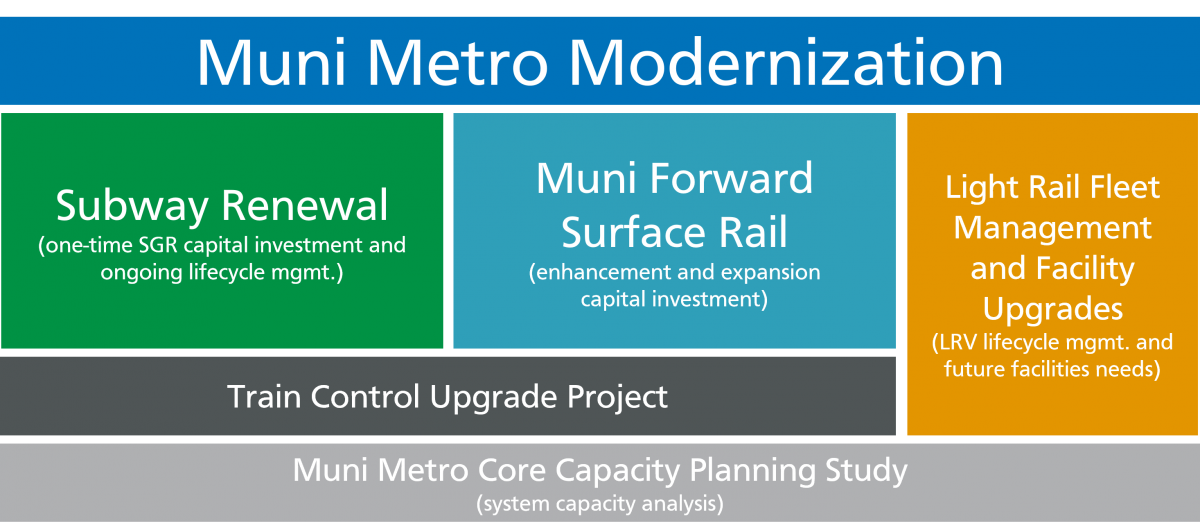By Erin McMillan
In order to achieve the SFMTA’s vision for transit service, we have some work to do. Staff have provided an overarching framework for how SFMTA will achieve a truly dazzling vision for Muni service: The Muni Metro Modernization program.

The Muni Metro Modernization program.
The program uses a multifaceted approach: As a foundation, making state of good repair upgrades and replacing aging systems through our Subway Renewal Program already underway. San Francisco's Muni Metro subway system moves our highest volumes of customers through the core of the city. And it operates on infrastructure that was constructed between 50 to 100 years ago, much of it original. It is well-documented that Muni Metro has been plagued with service reliability problems for decades. The Subway Renewal Program lays out a systematic approach to capital upgrades over the next ten years, targeting strategic repairs, replacing and enhancing our most critical systems. This work will improve our subway’s resilience and prepare it for the demands of the future. Much of this work over the next ten years include things that customers never see, but are essential to keeping the system safe, efficient and reliable.
Another major project that will increase the Muni Metro network’s capacity, and reduce wait times and crowding on your Muni Metro trips: the Train Control Upgrade Project (TCUP). TCUP possesses the greatest potential of any single investment to significantly improve system efficiency. Our outdated centralized train control system is under constant pressure and is increasingly operating beyond the capacity for which it was designed nearly three decades ago.
While we’ve learned operational and service lessons throughout the pandemic, we’re continuing to improve our ability to measure the health of the subway. Using data dashboards to monitor subway travel time, queuing, average daily subway delay and maximum trains per hour, we’re improving our ability to make informed decisions about subway operations and service. Following the successful pilot of the J Church surface-only route, we’re looking for ways to increase our adaptability and improve responsiveness to changing travel patterns.
In addition to improving subway infrastructure and performance, the Muni Forward program will focus on improving surface rail through capital improvements that will increase the reliability and performance of the line segments operating outside of the subway. Customers will continue to feel the positive impacts from the Muni Forward program with more reliable surface rail service that translates into a more reliable subway.
The Train Control Upgrade Project bridges state of good repair improvements and service improvements by replacing a 20+ year old system in the subway and expanding new technology to the surface. And of course, strategic investment in our light rail fleet and facilities is critical to achieve this work.
In addition to improving the infrastructure and service of Muni Metro, we are also planning for the future. The Muni Metro Core Capacity Planning Study sets out to answer critical planning questions for our system— What is our future higher-capacity transit system? What is the program of infrastructure projects and service that will get us there? How can we get more capacity in the subway and at the same time improve reliability? We have already begun to experiment with innovative service approaches, such as the J Church Surface-only Pilot, as a way to test some of the service ideas that will be explored further in the Core Capacity Planning Study. Building upon the work laid out in the Metropolitan Transportation Commission Bay Area Core Capacity Transit Study and the ConnectSF Transit Strategy, the Core Capacity Planning Study will develop a comprehensive long-term strategy for expanding the capacity of the Muni Metro system.
We know what the issues with Muni Metro are—and we have the tools and programs in place to improve the system. From capital improvements like train control system upgrades to improving our service performance through the Muni Forward program and innovative service solutions like the J Church Surface-only Pilot, we’re working to improve the reliability and service of the Muni Metro both in the near and long term.
For more information, visit the Muni Metro Modernization Program page.
Published May 04, 2022 at 01:50AM
https://ift.tt/atkM0nu
Comments
Post a Comment